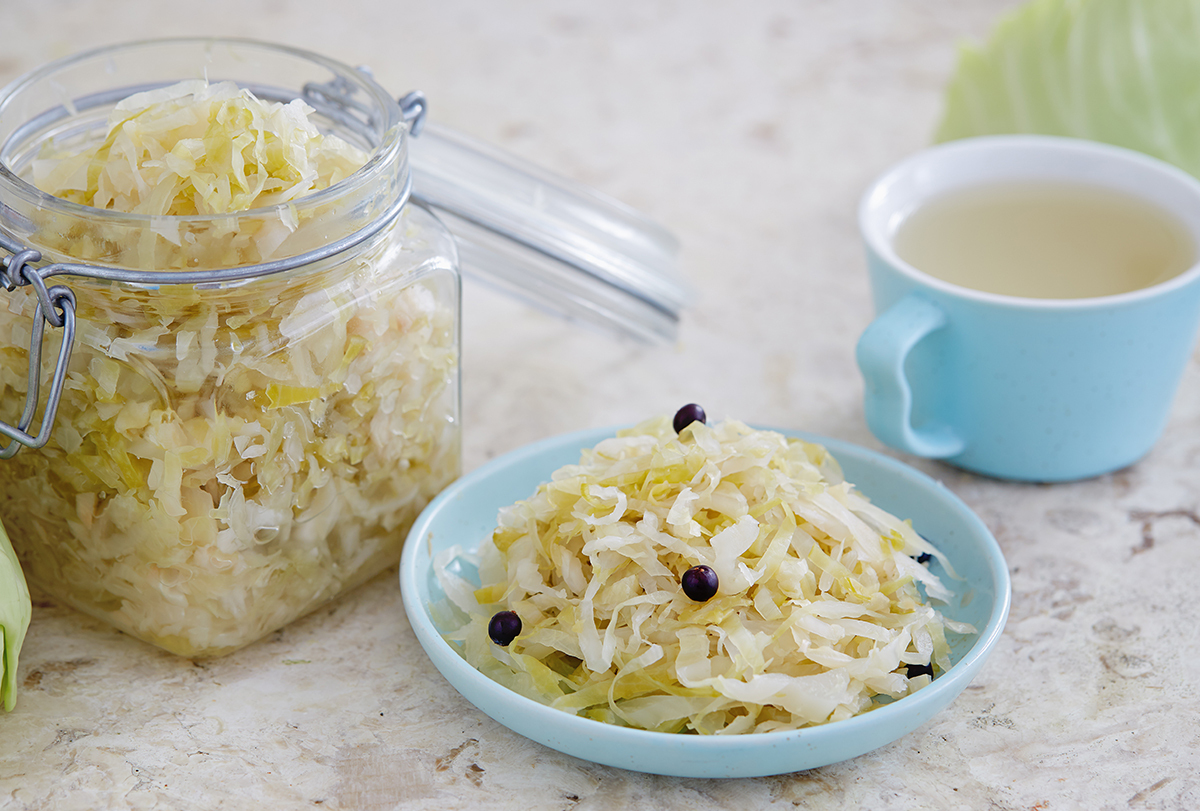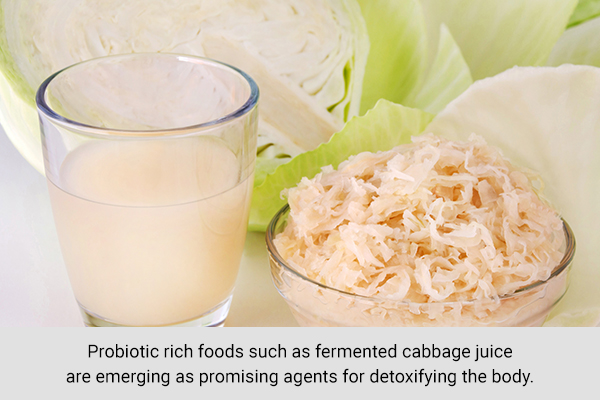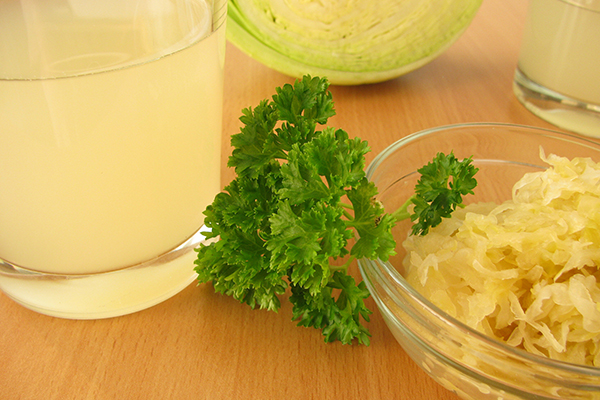In this article:
Cabbage is an extremely versatile vegetable popularly consumed all around the world in various preparations. In South Asian countries, it is cooked as a side dish; in South East Asian countries, it is added to soups and broths; and in some European countries, cabbage is fermented to make a pickle.

In parts of Albania, a country in the South of Europe, cabbage juice is fermented to prepare a special naturally effervescent drink. Fermenting cabbage juice gives it a nutritional boost, making it a health-supporting beverage.
Nutrients in Fermented Cabbage Products
One of the most popular cabbage products is sauerkraut, which is made by adding salt that is 2%–3% of the total weight of cabbage. The water that leaves the cabbage can be consumed as fermented cabbage juice. (1)
Cabbage by itself is rich in polyphenols, but fermented cabbage or its juice is even richer in nutrients. It has increased levels of vitamins E and C and healthy amounts of beneficial bacteria. (1)
Health Benefits of Fermented Cabbage Juice
Consuming cabbage juice offers many health advantages.
1. Supports gut health
Fermented cabbage juice contains probiotics, which are a strain of bacteria that improve the diversity of intestinal flora. These beneficial bacteria augment overall outcomes of health, including improving digestion and strengthening the intestinal barrier, which is necessary to prevent the entry of disease-causing microorganisms into the bloodstream. (2)
Self-reports of people who consume fermented foods regularly all indicate that they experienced improvements in digestion and a reduced occurrence of constipation. (3)
Fermented foods and drinks also treat diarrhea by reducing its frequency and symptoms. They also restore altered levels of gut microorganism levels after the use of antibiotics. (2)
2. Supports immunity

Not only do probiotics help in strengthening the intestinal barrier as mentioned earlier, but they also regulate immune responses. They increase the activity and production of immune cells that kill off disease-causing pathogens, reduce inflammation, and reduce the severity of infections. (4)
Fermented cabbage juice is also rich in vitamins C and E, both of which are involved in improving the immune responses of the body. (5)
3. Aids in weight loss
Fermented cabbage juice is also great for aiding weight loss and preventing the accumulation of fat in a high-fat diet. This ability is attributed to it being a rich probiotic.
In a study where men and women with obesity were given a supplement of probiotics for 12 weeks, they observed not only weight loss but also a reduction in fat mass. (6)
4. Decreases inflammation in the body
Fermented plant-based foods such as cabbage juice all reduce inflammation within the body. According to recent research, inflammation in the body is linked to the development of chronic diseases such as diabetes, arthritis, thyroid imbalances, and even cancers. (7)
The good news is that the polyphenols in fermented cabbage juice can reduce the substances that cause inflammation, fight free radicals, and reduce oxidative stress by increasing the activity of antioxidants in the body. (1)
5. Supports the body’s detoxification

The kidneys and liver detoxify the body from major toxins such as metabolic breakdown products of medications, heavy metals, and other foreign substances, and some food products can increase the activity of enzymes involved in the detoxification pathways.
Recently, probiotic-rich foods such as fermented cabbage juice are emerging as promising agents of detoxifying the body. (8)
The beneficial bacteria in fermented cabbage juice can bind toxins such as heavy metals, to aid its removal from the body and reduce toxicity. (9)
6. Improves brain health
Probiotic-rich foods also help control emotions and support brain health through the gut-brain axis. (10) This model explains how the intestinal gut microorganism diversity is linked to the emotion center of the brain and influences mood and nervous system disorders such as anxiety, depression, and even autism.
Fermented cabbage juice can also increase the absorption of nutrients vital to brain health such as magnesium and zinc. (11)
7. May reduce the risk of cancer
Due to their ability to increase the activity of antioxidants in the foods you eat, probiotic-rich foods such as fermented cabbage can prevent the conversion of healthy cells into cancer cells, thus reducing the overall risk of developing cancer. (7)
In addition, they boost the immune response of the body and bring about cancer cell death. (12)(13)
How to Make Fermented Cabbage Juice
Fermented cabbage juice can be prepared by fermenting cabbage leaves and then extracting its juice or by fermenting raw cabbage juice with the use of sugar.
Several recipes are available online, but you can prepare your own fermented cabbage juice by following these steps:
- Wash half a head of cabbage leaves well.
- Blend the cabbage with 1 cup of water.
- Strain the mixture to remove the solid pieces.
- Add the extracted cabbage juice to a glass jar along with 1 tablespoon of sugar (to kick-start the fermentation process).
- Add 1 more cup of water and keep it on your kitchen counter in a warm place with a loose cap.
- Keep checking for bubbles to appear for the next 3 days.
- Taste to make sure it’s not too sour and consume at the end of 5 days.
Some points to keep in mind:
- Depending on the temperature of your kitchen, your fermented cabbage juice will be ready between 3 and 5 days.
- Make sure the glass bottle or jar has a loose lid. If the lid is too tight, the pressure building inside from the gasses released may crack the bottle.
- Do not use a plastic or metal bottle, bowl, or jar to ferment any food item.
Expert’s tip: You can also add 1–2 apples while juicing to naturally sweeten the fermented cabbage juice.
Most-Asked Questions About Consuming Fermented Cabbage Juice

How much fermented cabbage juice should I drink each day?
One serving (200 ml) of fermented cabbage juice can be beneficial.
Who should avoid fermented cabbage juice?
If you are allergic to cabbage, are taking immunosuppressants, or taking drugs for mental health disorders, avoid drinking fermented cabbage juice.
Will fermented cabbage juice cause acidity?
No, fermented cabbage juice will not cause acidity. In fact, cabbage juice is actually beneficial in reducing acid reflux.
Final Word
Fermented cabbage juice is a great source of healthy probiotics that can benefit health in a variety of ways.
Apart from the direct influence of probiotics on improving digestion by increasing gut microorganism diversity, in recent studies, they have come out to be strong agents to protect the body against inflammation and the diseases caused by it such as diabetes, arthritis, and cancer.
Other benefits that drinking one serving of fermented cabbage juice offers include improving mental health disorders, detoxifying the body, supporting the immune system, and preventing weight gain.
- Was this article helpful?
- YES, THANKS!NOT REALLY


